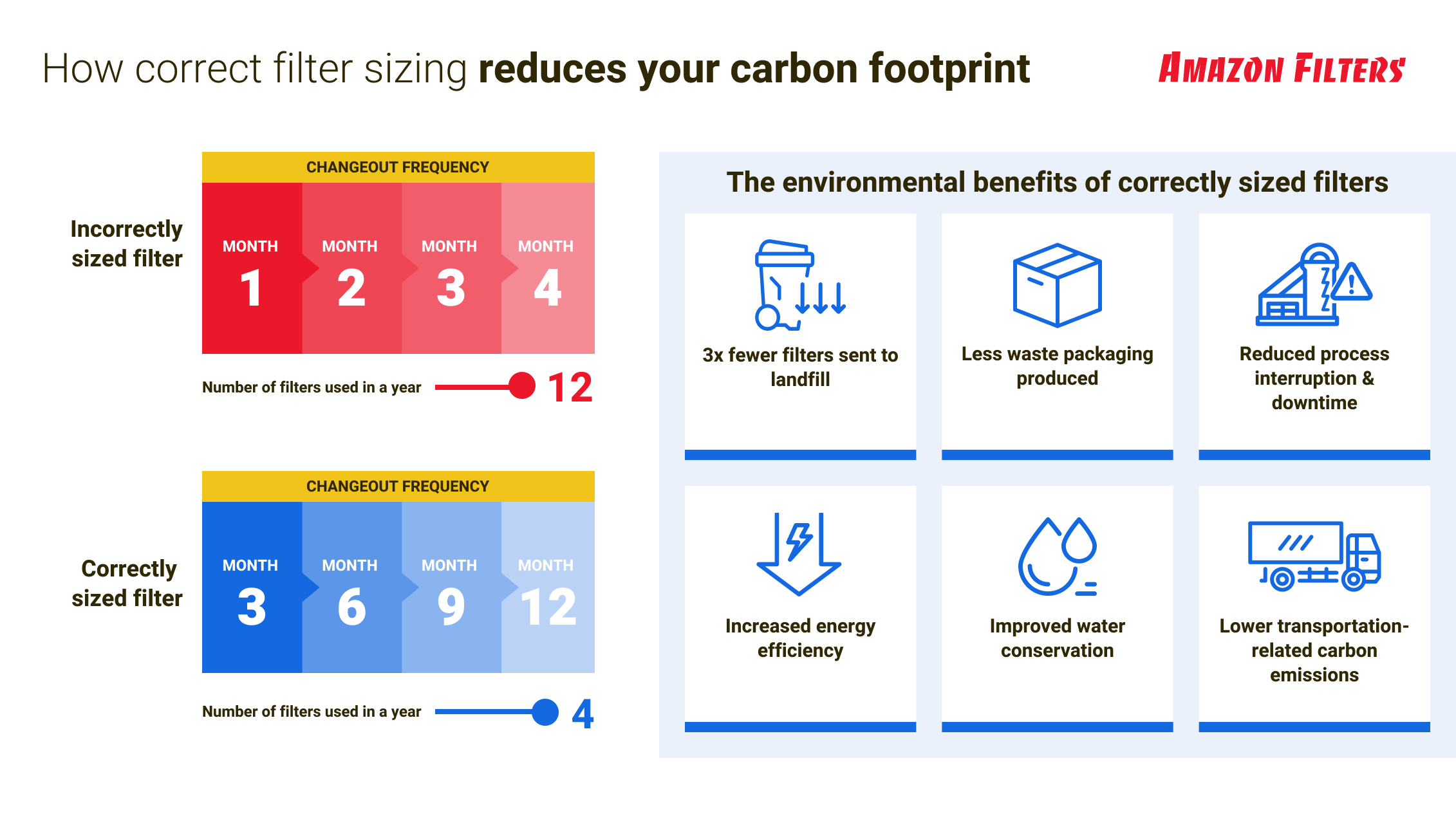Sustainability is the biggest talking point in the process industry. In the face of mounting pressure from environmental groups and eco-conscious consumers, manufacturers are exploring every avenue to make their products, processes, and operations greener. And this extends to their filtration processes.
Filtration plays a crucial role in purifying the water we drink, the air we breathe, and the soil that nurtures our crops. But it’s also synonymous with disposable plastics and waste. To achieve your sustainability goals, you must understand how filtration impacts your environmental footprint and what you can do to reduce it.
1. Waste
Filtration is a core component of various industrial manufacturing processes. However, most manufacturers continue to rely on disposable plastic filters, which end up in landfills due to the need for large-scale filter recycling programmes.
It’s not only the filters themselves that cause waste. Inefficient filtration processes fail to effectively capture and remove unwanted particles, leading to compromised products and increasing the amount of waste you produce.
Many filter manufacturers package their products individually or use plastic over paper or card-based packaging. This contributes to the 141 million tons of plastic packaging waste produced worldwide every year.
How to minimise waste
It’s impossible to eliminate waste from the filtration process entirely, but you can take steps to minimise it.
First, ensure your filtration solutions are the right size for your application. While installing the smallest filtration system possible to minimise initial capital costs may seem like a good idea in principle, it can have severe consequences.
Using undersized filters increases flow rates, leading to more frequent blockages and reducing final product quality. By contrast, correctly sized filters hold more dirt, minimising changeouts and preserving product quality.

You can reduce your environmental footprint further by working with suppliers who bulk package their filters (rather than wrapping them individually) to minimise cardboard usage. Bear in mind that this isn’t suitable for every application. For example, in pharmaceutical processes where final product quality is paramount, filters may require extra packaging to prevent damage during transit.
These measures might seem negligible, but every little helps. We reduced our CO2 emissions by 33,500kg in 2020 when we switched to cardboard packaging.
2. Energy consumption
Manufacturing processes use approximately a third of the world’s energy. Manufacturers are exploring every option to reduce their energy requirements and minimise their environmental footprint. And this includes lower-intensity processes, like filtration.
For example, water purification plants use reverse osmosis filters to remove salt and other impurities. These require high require high pressures to function, which increases energy usage. Manufacturers can reduce energy requirements by implementing protective depth filters in their processes to protect the membrane from premature blinding, reducing pressure drops and conserving energy.
There are also indirect energy costs. Everything from transporting filters to disposal of spent units adds to your total energy consumption, increasing your environmental footprint.
How to improve energy efficiency
In addition to using guard filters to minimise pressure drops, manufacturers can reduce energy consumption by:
- Using appropriate, high-quality filters that use less energy
- Ensuring correct filter placement
- Correctly sizing filters to maintain optimal flowrate and prevent blockages
3. Water usage
From pre-treatment and conditioning to cleaning, backwashing, and cooling, filtration is water-intensive.
Poorly designed systems and inefficient processes exacerbate the problem. They require more water to function effectively, increasing the strain on water sources which water-scarce regions can seldom afford.
At the same time, selecting the wrong filter media or process can increase the amount of wastewater you produce. The treated water contains more impurities, like suspended solids or microorganisms, that require longer or additional cleaning cycles to remove, resulting in higher water consumption.
How to reduce water consumption
The fastest way to tackle excessive water consumption is to recycle treated wastewater. For example, instead of draining chase water, food and beverage manufacturers can reuse it in non-critical applications, such as equipment cleaning.
Regularly auditing your filtration system and processes can also help you identify and eliminate inefficiencies, such as leaks, that contribute to water consumption.
4. Pollution
Arguably, filtration’s most significant impact on the environment is removing pollutants from various industrial manufacturing processes, including oil and gas production and effluent treatment.
Pollutants come in many forms:
- Dangerous chemicals
- Heavy metals
- Harmful particles
- Microorganisms
Removing potentially toxic substances helps to reduce groundwater, air, and soil contamination. Equally, effective filtration solutions enable you to reuse wastewater more efficiently, aiding water conservation efforts.
How to tackle pollution
Ineffective waste management and disposal processes increase the risk of contamination from hazardous material spills. And these can have severe and long-lasting consequences for wildlife. Pre-treating substances with chemicals, such as flocculants and coagulants, can help to improve separation and purification processes, reducing the environmental risks.
The benefits of reducing your environmental footprint
Making your manufacturing processes more environmentally friendly provides tangible benefits for you, your customers, and the planet. According to one report, 70% of manufacturers say their last sustainability programme helped reduce costs.
By working with the right filtration partner, you can reduce your environmental footprint without sacrificing quality or efficiency.

